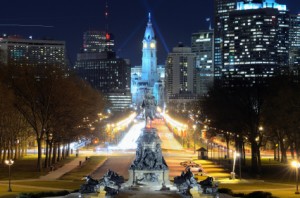Introduction to Pennsylvania Marriage Laws
November 7th, 2012

Pennsylvania's marriage laws are such that Universal Life Church ministers are occasionally denied permission to perform weddings there.
The solemnization of marriages by Universal Life Church ministers has generated disagreement among many in the legal community in recent decades. Each state in the union has a slightly different set of rules about who has the authority to perform marriages. Few states’ statutes on marriages have been as hotly contested, however, as the state of Pennsylvania, where courts have disagreed on the implementation of statutory language authorizing who may, and who may not, solemnize marriages within it.
Pennsylvania’s marriage laws are defined by the Pennsylvania Marriage Act (23 Pa.C.S.A. §1503). In addition to granting the power to solemnize marriages to most judges, as well as the mayors of any city in Pennsylvania, section 6 of the statute grants authority to perform marriage ceremonies to “A minister, priest or rabbi of any regularly established church or congregation”.[1] This statutory language has brought many questions to the legal arena in Pennsylvania. What constitutes a “regularly established church or congregation”? Can a minister of the Universal Life Church, ordained through non-traditional methods, be considered a “regularly established” minister”? The answer to these questions have varied by county, with a judge in York County, Pennsylvania declaring a marriage performed by a Universal Life Church minister to be invalid[2], and a judge in Bucks County, Pennsylvania declaring a marriage performed by a Universal Life Church minister to be valid within the language of the statute[3].
Some in the legal community have suggested that the differences between the York County and Bucks County decisions are at least somewhat motivated by the desires of the affected parties. While the individuals in the Bucks county decision wished to retain the status of their marriage, those in the York county decision had wished to have their marriage declared invalid.[4] Of greater legal importance, however, is the breadth or narrowness in which judges have interpreted the Pennsylvania Marriage Act.
Because the interpretation of a “regularly established church or congregation” has not been defined by the statute, the courts in York and Bucks counties have taken two distinct approaches to interpreting this provision. In York county, the court decided on a restrictive view of this statute, holding that the minister performing the ceremony was not authorized because he did not regularly meet in a church or office of the Universal Life Church, and that he did not regularly serve a congregation of people.[5] However, the Bucks county court disagreed with this restrictive view, noting that the definition of the word “church”, for purposes of the Marriage Act, was not limited to “a merely physical place of worship”. The court felt that to restrict this definition of church “would limit persons who are authorized to perform a marriage… to only those religious officials who preside over a group of worshipers in a specific building.”[6] This interpretation, the court decided, would create “unjust results”[7]. The court further reasoned that if the Pennsylvania legislature had intended to read the phrase “church or congregation” in the narrow manner read by the York County court, they would have specified the definitions of these words in the statute.[8]
Because there have been no appellate decisions in Pennsylvania that settled the differences between these two interpretations of the Pennsylvania Marriage Act, many who have had their marriages solemnized by ministers of the Universal Life Church in that state are left without a clear understanding of the legal validity of their marriage. Marriage is, however, a civil contract, and under the marriage laws of Pennsylvania, there are alternate ways by which a marriage may legally be performed in compliance with the law. Those who wish to be married without officiating clergy may do so under the rules listed in 23 Pa. C.S.A. §1502.
Have an opinion about the marriage laws governing marriage in Pennsylvania? Please don’t hesitate to let us know what you think in the forum below.
[1] 23 Pa.C.S.A. §1503(6)(2008).
[2] Heyer v. Hollerbush, No. 2007-Su-002132 Y08
[3] Jason B. O’Neill, 08-01620-29-1 at 12.
[4] Alexandra Marin, Internet-Ordained Ministers and Marriage in Pennsylvania: Bucks County and York County disagree on legality of marriage according to the Pennsylvania Marriage Act, 10 Rutgers J.L. & Religion 18 (2009).
[5] Heyer v. Hollerbush, No. 2007-Su-002132 Y08
[6] Jason B. O’Neill, No. 08-01620-29 at 6.
[7] Id. at 7.
[8] Id.



Hello,
Can you tell me of the status of this disagreement. I see some websites in Pennsylvania from ULC reverends. Is the ULC working to resolve this? What can a new ULC member, like me, do? I would like to Officiate weddings. Is there a way for me to move forward?
Thank you–
Walter
I am a newly ordained minister through the Universal Life Church. I did this in order to officiate marriages of my friends at no additional cost. I have a letter of good standing, marriage certificates, ect that is needed to perform a ceremony. I have also read about the York and Buck County rulings, and their conflicting decisions. My question is, and the ACLU agrees, is denying a minister from ULC to perform a marriage anot infringement on the 1st amendmrnt (freedom to practice any religion as long as no harm is done doing so)
I would like to no if I can perform a marriage in York county I been ordained for 3 years from ULC and I do preach at different churches in other states
Yes, you can. See our court case here:
https://ulccaselaw.com/ulc-case-law-legal-blog/allegheny-county-pa-settles-lawsuit-with-universal-life-church/